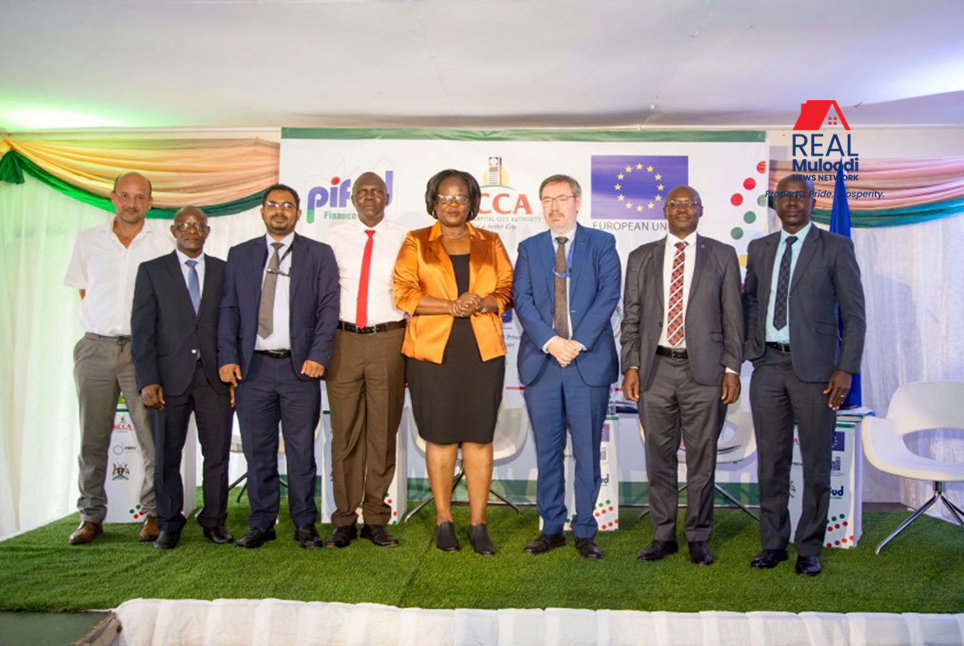UGANDA, Kampala | Real Muloodi News | The Wakiso District municipalities of Entebbe, Nansana, and Makindye Ssabagabo have received the Integrated Revenue Administration System (IRAS) and data centre from the Kampala Capital City Authority (KCCA).
IRAS is a web and mobile application platform that aids municipalities in collection of local revenue from the digital registration, assessment, billing, and payment of taxpayers. IRAS also facilitates comprehensive digital GIS enabled property valuations which are used as the basis for levying property rates.
The KCCA Executive Director, Dr Dorothy Kisaka, stated during a handover event on September 27 at the Makindye Ssabagabo Municipality offices that the system has already shown its capacity and effectiveness to address local revenue management and administration issues.
“The manual system was full of corruption from the assessors, and lacked health systems to track whatever was going on. But with this new system, automation of key processes such as taxpayer registration, assessments, payments and revenue reconciliation and accounting, objection and appeals handling has been done well,” she said.
According to Dr Kisaka, the four-year-old initiative has improved local governments’ performance in terms of providing services.
“Taxpayers have increased from 45,000 to 173,678, which is more than three times. There has been increased revenue growth, from Shs2.6 billion to Shs4.7b in Makindye Ssabagabo, and from Shs2.5b to Shs5 billion in Nansana Municipality,” she added.
According to Mr Ismail Ahmad, the Ministry of Local Government’s main Inspector, the new approach has made their work easier.
“As Ministry of Local Government, the challenge has always been dwindling local revenues. However with the coming of systems such as IRAS, there have been improvements and an upward trend as far as local revenue is concerned,” Mr Ahmed said.
He did, however, encourage all local governments to continuously monitor the system and ensure that people are made aware of how it operates.
Lennart Deridder, the team leader for the Inclusive Green Economy, a sustainable growth model at the European Union, spoke at the event and committed to continue assisting Uganda’s local governments in digitising local revenue collections to ensure accountability and sound management of public funds.
“It is our hope that enhanced transparency in revenue collection will result in an increase in revenues generated by these municipalities, which in turn will enable them deliver more services and infrastructure to their population,” Mr Deridder said.
The Mayor of Makindye Ssabagabo, Mr Godfrey Ssemwanga, discussed the effects of the new digital tax collecting method.
“The cases of corruption and human errors have reduced; the taxpayer now gets all the information quickly on his/her phone. I think this is the best system,” Mr Ssemwanga said.
However, he added that the system has also presented several difficulties, including failing to capture arrears and malfunctioning.
“When we came for budgeting for this financial year, we realised that we had arrears; there are those taxpayers who did not pay by the end of the financial year and the arrears are not activated in the system hence registering losses,” he said.
Mr Ssemwanga also mentioned that the new technology occasionally fails, bringing work to a halt.
IRAS Taxation System
IRAS was created in 2019 to encompass all revenue streams for local governments. It was created by the European Union with World Bank assistance and was initially tested in Nansana, Fort Portal City, and Gulu City.
The system is simple to use since the taxpayer may access it through a mobile phone or computer.
READ MORE LIKE THIS:
Landlords Beware: The Penalty for Not Telling URA the Truth Now USh110m



